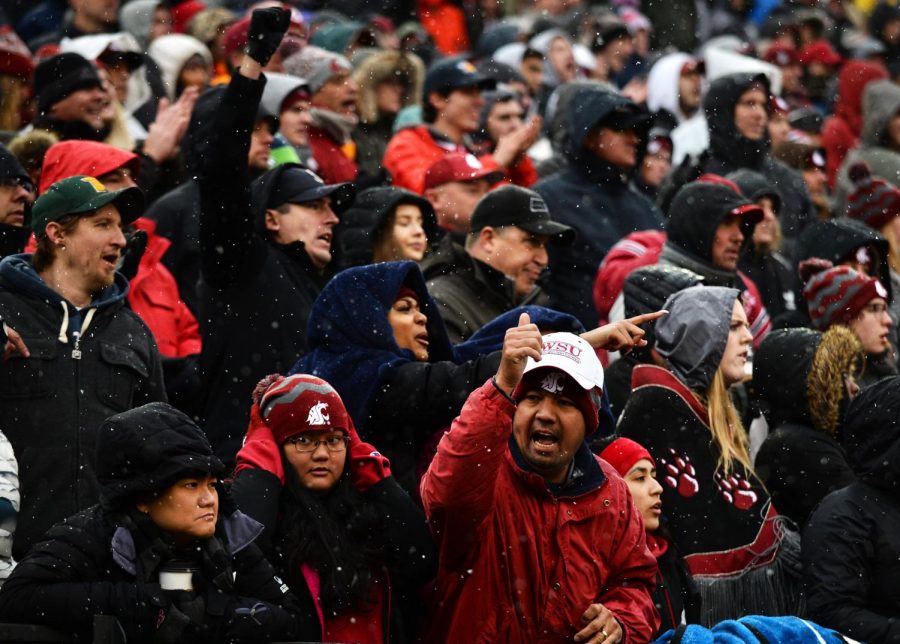Student-athletes are students second
Performance on the field is prioritized, revered over learning in the classroom for university athletes
ABBY LINNENKOHL | The Daily Evergreen
WSU football fans express disappointment over the calls the referees made in Saturday’s game against Stanford.
November 7, 2017
Being a student should be the priority of student-athletes, hence why “athlete” comes after the hyphen. At least, that has been the argument for decades. As fans and universities have shown, however, excelling in the classroom is far less important than performing on the field.
WSU sport ethics professor Scott Jedlicka said he does not fully buy into the idea that fans care about how athletes are doing in the classroom.
“I don’t think people necessarily care whether athletes are good students or bad students,” he said. “I think for some sports, it’s sort of an expectation that they aren’t very good students. If someone has a good GPA, it’s sort of a pleasant surprise.”
However, the average fan doesn’t know what their favorite college athlete’s GPA is, and even if it was made obvious, they probably would not care. Nobody goes to a football game to hear about how well the defensive lineman is doing in English. Fans go to watch the athlete perform.
When a varsity sports team tweets, posts or writes about the academic success of its athletes, the fan engagement and interactions are significantly lower on average than when a team posts about athletic success.
Jedlicka compared drug use in sports to the argument that fans would like to believe athletes are doing well in school, even if they don’t care.
Like fans hoping athletes are not taking performance-enhancing drugs, they also hope athletes have above-average grades, he said. In both instances, though, the policies put into place are enough to satisfy the low interest in things other than athletics.
“They would like to believe the athletes are going to class and getting a good education,” Jedlicka said, “but they’re not going to go the extra length to see what’s happening behind the curtain.”
Behind the curtain sometimes includes a secret to keep athletes on the field.
Take University of North Carolina, for example. An eight-month investigation found the institution was aiding athletes with artificial grades from fake classes. Thousands skated by with some university coaches knowing it would help their student-athletes remain eligible.
Motives behind this one fraudulent scandal are plentiful, but Jedlicka believes we need to look first at what the system incentivizes.
“Like many people like to say, college sports are a business,” he said. “That system is one in which academics all too often become an obstacle to be overcome or something to be tolerated.”
As he described, businesses want to maximize revenues and increase operation efficiency. This is where the conflict arises. Thinking in business terms, putting the best product on the field would not include asking athletes to spend time away from the field and in class, Jedlicka said.
Athletes prioritizing academics over sports requires not operating like a business all the time, he said.
“Having a lucrative, spectacular college sport enterprise means cutting corners on education,” Jedlicka said. “It means saying, ‘Well, let’s do what we have to do, let’s just check the boxes so we are compliant with the rules that are imposed upon us.’ ”
Going back to the UNC academic fraud scandal, the NCAA sent a significant message by ruling the university would not be punished.
Jedlicka, who supports compensating college athletes, said the big question is moving from whether college athletes should be paid to whether they must be enrolled.
“I think there’s a key difference between the appearance of being a student and actually being a student,” he said. “So, I can see in the future, athletes being primarily online students or full-time enrollment being optional.”
Because fans, universities and the NCAA have shown a disinterest in the educational aspects of athletes’ lives, it shouldn’t matter if we drop student from student-athletes.
“The idea that athletes need to be students and that that’s an instrumental part of the product, at least from a demand standpoint,” Jedlicka said, “I’m not sure that’s the case.”










